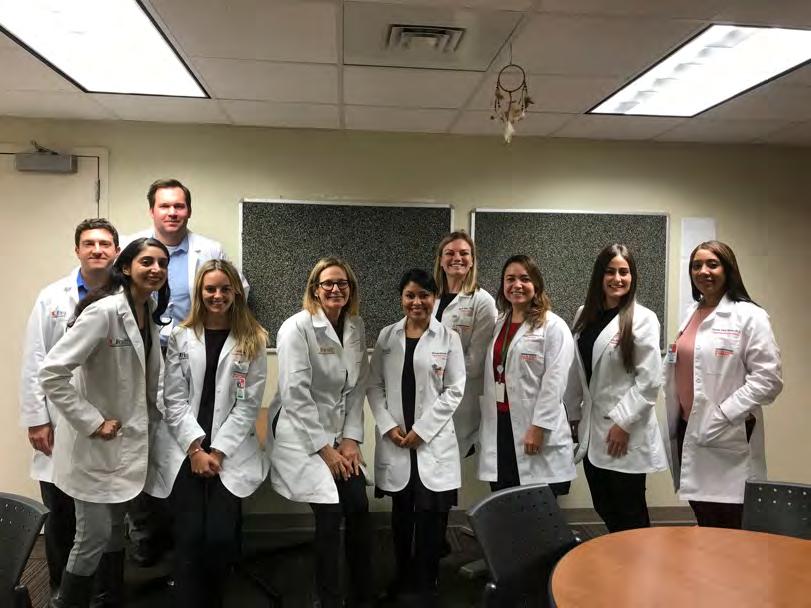
3 minute read
Basic Science Programs
• MBI Frailty Project
Drs. Levin and McInerney oversee the Frailty project, Stacy Merritt coordinates the database logistics and Dr. Seixas-Saporta analyzes the aging brain MRI images. Data collected includes demographic, medical/clinical, neuropsychological, neuroimaging, psychosocial and frailty data. Dr. Levin and team successfully launched their virtual neuropsychological testing, which is the data source for the project. There are 517 subject records in the study. With all working from home, this year’s data has not been entered.
Data analysis has continued on MRI brain image analyses.
- Over the past year, all high quality structural images (n=128) have been processed.
Dr. Seixas-Saporta, our MBI fellow has been exploring volumetric differences in hippocampal volumes as well as in other structures early affected in those at AD risk.
She is also exploring the brain aging process in normal aging and in pathological conditions through the study of the cerebellum. She focuses on this brain structure because the cortical contributions to age-related declines in motor and cognitive performance are well-known but potential contributions of the cerebellum are less clear. The diverse functions of the cerebellum go beyond motor function and include emotion, language and cognition which make it an important structure to investigate in aging. Dr. Seixas-Saporta is currently working on the analysis of the data and plans to publish the results in 2021.
• Dr. Levin is Co-Investigator on the “Role of Gut Microbiota on the Brain Metabolism,
Cognition, Immune Function and Inflammation in Alzheimer’s disease: Novel Biomarkers and Understanding Mechanisms” research project funded by FL DOH. The goal of this study is to test the associations between dysbiosis of the gut microbiome and intestinal permeability and microbial translocation markers with brain GABA, brain inflammation markers, peripheral amyloids and lipopolysaccharides, peripheral inflammation markers and cognitive function in patients at the early stage of cognitive impairment and agematched healthy controls.
Dr. Levin’s Team
• Dr. Ramos continued to work on his projects:
- “Atrophy and Neurocognition in Treated Obstructive sleep apnea (MAGNETO)” This (NIH) study was able to enroll subjects despite the COVID-19 Pandemic by transitioning parts of it to take place virtually. This investigator initiated study evaluates the neuroimaging and neurocognitive substrates of residual daytime sleepiness in patients with treated obstructive sleep apnea. Sleep apnea can affect cognition.
- “Sleep Apnea Phenotypes in Latinos (SLEPT)” (NIH) will continue in 2021. This study will help develop risk-stratification strategies for sleep apnea and inform future intervention studies in cardiovascular risk and sleep apnea; providing a step towards personalized medicine in sleep. This study would contribute to reducing health disparities among diverse Latinos, who are burdened by increased risk for cardiovascular disease and a high prevalence of sleep apnea. Both of these can contribute to cognitive decline in aging.
• Dr. Rundek has made progress on the following studies:
“The Brain Vascular Imaging Phenotypes, Vascular Comorbidities and the Risk for
Alzheimer’s Study (VIP Study)” - Under Dr. Rundek’s leadership, Dr. Seixas-
Saporta and VIP study team conducted visual and automated MRI analysis to quantify silent cerebrovascular disease-related lesions, such as white matter hyperintensities.
In addition, the analyses of cerebral microbleeds, silent brain infarcts and enlarged perivascular spaces were visually analyzed, while automated methods are in development. There are 299 cases with MR images available for analyses. The study includes 5 different MRI processing techniques: 2 visual (Fazekas; MARS/BOMBS); and 3 semi-automated (one for each type of the following lesions: white matter hyperintensities; lacunes; enlarged perivascular spaces). Currently, 83% and 23% of the 299 cases were completed for visual and semi-automated analysis, respectively, and the results are entered in the REDCap database.
- “Family Study of Cognitive Decline Risk” research was extended this year to study cognitive assessments in collaboration with Dr. Ron Lazar, MBI Director at UAB. The study is a NIH supplement to a currently ongoing NINDS-Family study of genetic risk for subclinical atherosclerosis. Over 30% of the targeted population has received cognitive assessments by phone. This NIH supplement will investigate genetic and epigenetic markers of vascular cognitive impairment (PI: Rundek).
“Disparities in Stroke Outcomes and Care Delivery in Patients with Atrial Fibrillation:
FLiPER-AF” has been completed this year. Several manuscripts were published using the data of this study and show a disparity in stroke outcome in patients with Atrial
Fibrillation (AF). Women with AF have poor outcome after stroke (increased inhospital mortality and discharge disability) in comparison to men. Women were also less likely discharged on anticoagulation then men.







